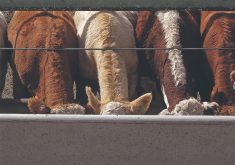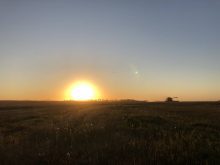A class action lawsuit alleging the government of Canada and G3 Canada Ltd. unlawfully used millions of farmer dollars to privatize the Canadian Wheat Board (CWB) has been certified after wending its way through the courts for 10 years.
Court of Queen’s Bench Justice Chris Martin delivered his written judgment Tuesday in Winnipeg, clearing the way for a judge to hear the allegations on behalf of an estimated 70,000 or so western Canadian farmers who delivered grain to the wheat board’s pool accounts in 2010-11 and 2011-12.
Read Also

Pea, lentil outlooks have some positive signals – Penner
As pulse growers consider what to plant this spring, Chuck Penner of Leftfield Commodities Research said there is some optimism in the Canadian pulse market. Penner gave a presentation at the Saskatchewan Pulse Growers meeting in Swift Current on Feb. 4.
“I think it is good news for the farmers who felt they weren’t dealt with fairly when (Agriculture Minister Gerry) Ritz and (Prime Minister Stephen) Harper were privatizing the wheat board,” Stewart Wells, a Swift Current, Sask., farmer and member of the Friends of the Canadian Wheat Board, said in an interview Thursday. “The wheels of justice grind slowly but they’re still grinding.
“It’s the first major progress since the case was launched in 2012 and it’s certified so this is going to be heard in court. It’s just not going to be swept under the rug somewhere. So that’s a pretty major advancement.”
However, Wells didn’t rule out the possibility that the government and G3 will appeal Justice Martin’s decision.
An out-of-court settlement is also possible.
The Harper government government removed the CWB as the sole marketer of western Canadian wheat and barley destined for export or domestic human consumption Aug. 1, 2012.
In 2015, G3 (Global Grain Group), newly formed to subsume the CWB, agreed to invest $250.5 million and in return received the CWB’s assets from the federal government.
G3 is a joint venture firm majority-owned by the state-owned Saudi Agricultural Livestock Investment Co. (SALIC) and Bunge.
The lawsuit brought by Brookdale, Man., farmer Andrew Dennis alleges Ritz acted unlawfully by taking $150.9 million of farmers’ money from the CWB’s pool accounts to help privatize the wheat board.
One hundred and forty-five million dollars was used to triple the wheat board’s contingency fund and $5.9 million went to cover some of the transition costs.
Under the Canadian Wheat Board Act, all money collected in the CWB’s pool accounts earned from marketing farmers’ grain was required to be paid to farmers, less board operating expenses.
“What’s alleged is that Gerry Ritz… was acting illegally and not in good faith — the legal phrase is misfeasance while in public office — when he directed money to the contingency fund that we argue ought to have been paid to farmers instead,” Wells said.
“We argue that he was morally and legally wrong to be hiving off money that should have gone to the pooling accounts and been paid to farmers but instead he was trying to build up the Canadian Wheat Board as an entity so he could later on give it away to Saudi Arabia and Bunge.”
The CWB’s board of directors unanimously passed a resolution calling on the government to cover the cost of privatizing the board instead of farmers, Wells said.
“And then Ritz said in public that he would pick up all the cost, but when the (CWB’s) final annual report came out it showed that they had taken $5.9 million out of the pooling account to cover restructuring costs,” he said. “It makes no sense. It just loops back to the notion that farmers weren’t being treated fairly.”
The suit also asks for $10 million, plus interest since 2012, in damages, bringing the total compensation sought to $160.9 million, excluding interest.
“It’s not that much per individual farmer (if the suit is won),” Wells said. “It totally depends how many tonnes they (farmers) delivered to the pools in those two years, but that’s one of the reasons class actions were invented. It wouldn’t make sense for one or a very small group of farmers to take this sort of action, but it certainly makes sense to launch it as a class.”
Farmers who delivered to the pools in 2010-11 and 2011-12 are automatically part of the class action lawsuit unless they opt out, Wells said.
More information for affected farmers will be posted on a website, he added.
Wells doesn’t know when the case will be heard, but doesn’t rule out it taking another three to five years to resolve.
“They (federal government and G3) have been deliberately trying to delay this process all the way along for the last 10 years… but this is a very significant step toward getting the action certified having the representative plaintiff Andrew Dennis named in the action so he can carry it forward on behalf of all these farmers,” Wells said. “It’s a really crucial step. Without this the case couldn’t have gone anywhere.”
Wells declined to disclose how much money has been spent litigating the case so far.
“We have said all along that we are very grateful to all of the farmers that supported us when we started fundraising for this action back in very, very late 2011 and then in 2012, 2013 and 2014,” he added. ‘We wouldn’t have gotten anywhere without the support of those farmers there’s no question about that. This is truly the farmers’ action. Everybody is looking forward to the result.”
While the case is about the alleged misuse of farmers’ money, it’s also about holding government to account, Wells said.
“Cabinet, through orders-in-council, can change some things but they can never override the existing legislation,” he said. “And that’s what we are arguing happened here — that Ritz was overriding the original legislation with his orders-in-council, which in turn makes his actions illegal.
“Whether they (farmers) agreed with the wheat board being a (mandatory) marketing agency or not they still didn’t deserve to have money taken from the pooling accounts and just given to the King of Saudi Arabia and Bunge.”
After taking over the CWB, the new G3, renamed G3 Canada Ltd., was 50.1 per cent owned by SALIC and Bunge and up to 49.9 per cent potentially owned by farmers, depending on how much grain they delivered to the new firm.
Farmers were to earn $5 of G3 equity for every tonne.
G3 Canada had two shareholders — G3 Global Grain Group and the farmers’ equity trust. Farmers who deliver to CWB own units in the trust and the trust owns shares in G3 Canada Limited.
After the farmers’ equity is fully allocated, or in seven years (2022), G3 Canada Ltd. can buy the equity, but isn’t obliged to.
In 2016 Reuters reported SALIC’s ownership within G3 Global Grain Group jumped to 75 per cent from 49 per cent, according to an April 28, 2016 Bunge filing.
— Allan Dawson is a reporter for the Manitoba Co-operator at Miami, Man.
















